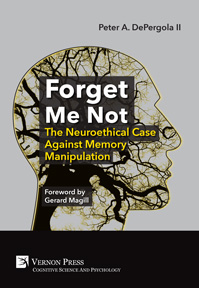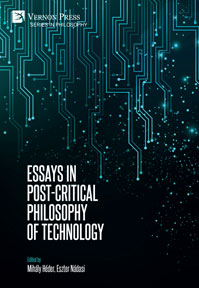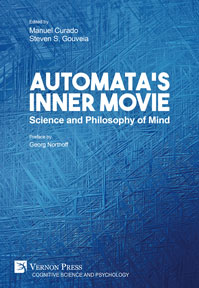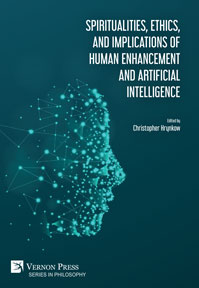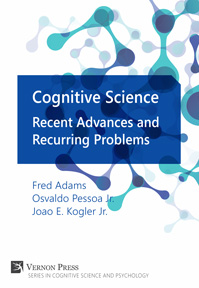The Age of Artificial Intelligence: An Exploration
Steven S. Gouveia (Ed.)
by Kulvinder Panesar (York St John University), Federico Pistono , Stephen Rainey (University of Oxford), Frederic Gilbert (University of Tasmania, Australia), Eray Özkural (Bilkent University, Turkey), Vernon Vinge (San Diego State University), Hasse Hämäläinen (Jagiellonian University), Federico Piston ... , Natasha Vita-More (University of Advancing Technology), Ricardo M. Ferrer (University of Granada, Spain), Txetxu Ausin (University of the Basque Country, Spain), Aníbal M. Astobiza (University of the Basque Country, Spain), Tomislav Miletic (University of Rijeka, Croatia), Peter A. DePergola II (University of Massachusetts Medical School; College of Our Lady of the Elms), Soenke Ziesche (Maldives National University, Maldives), Mariana Chinellato Ferreira (University of Coimbra, Portugal), René Mogensen (Birmingham City University), Caterina Moruzzi (University of Nottingham), Steven S. Gouveia (University of Porto, Portugal), Nicole A. Hall , Cody Turner (University of Connecticut), Ben Goertzel (Xiamen University, China), Gabriel Axel Montes (University of Newcastle), David Pearce (Neuroethics Foundation), Daniel Dennett (Tufts University), Stevan Harnad (University of Québec; University of Southampton), Roman V. Yampolskiy (University of Louisville) Show more
Purchase this book
(click here to change currency)
This is a most exhilarating book on a theme of major impact nowadays: artificial intelligence. It consists in a series of essays by prominent contributors from institutions all over the world such as Stevan Harnad, David Pearce, Eray Ozkural, Mariana Chinellato Ferreira and Daniel Dennett. Besides, the book covers a wide range of subjects connected to artificial intelligence such as the nature of intelligence, the problem of consciousness, aesthetics and artificial intelligence, neuroethics and the ethics of artificial intelligence. Gouveia´s book offers the reader a plethora of in-depth examinations of them in each section of his collection.
Professor João Teixeira
Universidade Federal de São Carlos, São Paulo, Brazil.
With worldwide spending estimates of over $97 billion by 2023, it is no surprise that Artificial Intelligence (A.I.) is one of the hottest topics at present in both the private and public spheres. Comprising of vital contributions from the most influential researchers in the field, including Daniel Dennett, Roman V. Yampolskiy, Frederic Gilbert, Stevan Harnad, David Pearce, Natasha Vita-More, Vernon Vinge and Ben Goertzel, ‘The Age of Artificial Intelligence: An Exploration’ discusses a variety of topics ranging from the various ethical issues associated with A.I. based technologies in terms of morality and law to subjects related to artificial consciousness, artistic creativity and intelligence.
The volume is organized as follows: Section I is dedicated to reflections on the Intelligence of A.I., with chapters by Soenke Ziesche and Roman V. Yampolskiy, Stevan Harnad, Daniel De... nnett and David Pearce. Next, Section II discusses the relationship between consciousness, simulation and artificial intelligence, with chapters by Gabriel Axel Montes and Ben Goertzel, Cody Turner, Nicole Hall and Steven S. Gouveia. Section III, dedicated to aesthetical creativity and language in artificial intelligence, includes chapters by Caterina Moruzzi, René Mogensen, Mariana Chinellato Ferreira and Kulvinder Panesar. The subsequent Section IV is on the Ethics of the Bionic Brain with the participation of Peter A. DePergola II, Tomislav Miletić and Frederic Gilbert, Aníbal M. Astobiza, Txetxu Ausin, Ricardo M. Ferrer and Stephen Rainey and Natasha Vita-More. Finally, Section V follows on the Ethics of Artificial Intelligence with chapters by Federico Pistono and Roman V. Yamploskiy, Hasse Hämäläinen, Vernon Vinge and Eray Özkural.
The Age of Artificial Intelligence is imminent, if not here already. We should ensure that we invest in the right people and the right ideas to create the best possible solutions to the problems of the present and prepare for those of the future. This edited volume will be of particular interest to researchers in the field of A.I. as well of those in Cognitive Science (Philosophy of the Mind, Neuroscience, and Linguistics), Aesthetics and Arts, Applied Ethics and Political Philosophy / Law. Students studying the aforementioned topics can also benefit from its contents.
Show more
LIST OF ACRONYMS
LIST OF FIGURES
LIST OF TABLES
INTRODUCTION
SECTION I: INTELLIGENCE IN ARTIFICIAL INTELLIGENCE
CHAPTER 1 TOWARDS THE MATHEMATICS OF INTELLIGENCE
Soenke Ziesche
Maldives National University, Maldives
Roman V. Yampolskiy
University of Louisville, USA
CHAPTER 2 MINDS, BRAINS AND TURING
Stevan Harnad
Université du Québec à Montréal, Canada;
University of Southampton, UK
CHAPTER 3 THE AGE OF POST-IN... TELLIGENT DESIGN
Daniel C. Dennett
Tufts University, USA
CHAPTER 4 HUMAN AND INTELLIGENT MACHINES: CO-EVOLUTION, FUSION OR REPLACEMENT?
David Pearce
Neuroethics Foundation
SECTION II: CONSCIOUSNESS, SIMULATION AND ARTIFICIAL INTELLIGENCE
CHAPTER 5 MINDPLEXES, NON-ORDINARY CONSCIOUSNESS, AND ARTIFICIAL GENERAL INTELLIGENCE
Gabriel Axel Montes
Hong Kong Polytechnic University, Hong Kong
Ben Goertzel
SingularityNET Foundation
CHAPTER 6 THE COGNITIVE PHENOMENOLOGY ARGUMENT FOR DISEMBODIED AI CONSCIOUSNESS
Cody Turner
University of Connecticut., USA
CHAPTER 7 HUMAN EXPERIENCE AND ARTIFICIAL INTELLIGENCE
Nicole A. Hall
Independent Scholar
CHAPTER 8 ARE WE REALLY LIVING IN A SIMULATION?
Steven S. Gouveia
University of Minho, Portugal
SECTION III: AESTHETICS AND LANGUAGE IN ARTIFICIAL INTELLIGENCE
CHAPTER 9 CAN A COMPUTER CREATE A MUSICAL WORK? CREATIVITY AND AUTONOMY OF AI SOFTWARE FOR MUSIC COMPOSITION
Caterina Moruzzi
University of Nottingham, UK
CHAPTER 10 FORMAL REPRESENTATION OF CONTEXT IN COMPUTATIONAL CREATIVITY FOR MUSIC
René Mogensen
Birmingham City University, UK
CHAPTER 11 A HUMAN TOUCH IN COMPUTER-GENERATED LITERATURE
Mariana Chinellato Ferreira
University of Coimbra, Portugal
CHAPTER 12 NATURAL LANGUAGE PROCESSING IN ARTIFICIAL INTELLIGENCE: A FUNCTIONAL LINGUISTIC PERSPECTIVE
Kulvinder Panesar
York St John University, UK
SECTION IV: THE ETHICS OF THE BIONIC BRAIN
CHAPTER 13 THE BIONIC BRAIN: PRAGMATIC NEUROETHICS AND THE MORAL PLAUSIBILITY OF COGNITIVE ENHANCEMENT
Peter A. DePergola II
University of Massachusetts Medical School, USA;
College of Our Lady of the Elms, USA
CHAPTER 14 DOES AI BRAIN IMPLANT COMPROMISE AGENCY? EXAMINING POTENTIAL HARMS OF BRAIN-COMPUTER INTERFACES ON SELF-DETERMINATION
Tomislav Miletić
University of Rijeka, Croatia
Frederic Gilbert
University of Tasmania, Australia
CHAPTER 15 THE ETHICS OF BRAIN-COMPUTER INTERFACES (BCI)
Aníbal M. Astobiza
University of the Basque Country, Spain
Txetxu Ausin
Institute of Philosophy, Spanish Research Council,
(CCHS/CSIC)
Ricardo M. Ferrer
University of Granada, Spain
Stephen Rainey
University of Oxford, UK
CHAPTER 16 WISDOM AS META-KNOWLEDGE: A PRACTICAL APPLICATION OF ARTIFICIAL GENERAL INTELLIGENCE AND NEURAL MACROSENSING
Natasha Vita-More
University of Advancing Technology, USA
SECTION V: ETHICS OF ARTIFICIAL INTELLIGENCE
CHAPTER 17 UNETHICAL RESEARCH: HOW TO CREATE A MALEVOLENT ARTIFICIAL INTELLIGENCE
Federico Pistono
Independent Scholar
Roman V. Yampolskiy
University of Louisville, USA
CHAPTER 18 THE SEARCH FOR X: GROUNDING RIGHTS AND OBLIGATIONS IN THE AGE OF ARTIFICIAL INTELLIGENCE
Hasse Hämäläinen
Jagiellonian University in Kraków, Poland
CHAPTER 19 THE COMING TECHNOLOGICAL SINGULARITY: HOW TO SURVIVE IN THE POST-HUMAN ERA
Vernor Vinge
San Diego State University, USA
CHAPTER 20 EPISTEMOLOGICAL AND ETHICAL IMPLICATIONS OF THE FREE-ENERGY PRINCIPLE
Eray Özkural
Bilkent University, Turkey
CONTRIBUTORS
INDEX Show more
Steven S. Gouveia is completing his PhD at the University of Minho (Portugal), funded by the Science and Technology Foundation, under the supervision of philosopher Manuel Curado (University of Minho) and neuroscientist Georg Northoff (University of Ottawa). He is a visiting researcher at the Minds, Brain Imaging and Neuroethics Group at the Royal Institute of Mental Health, University of Ottawa, and a researcher of the Lisbon Mind and Reasoning Group (Nova University of Lisbon) and the Mind, Language and Action Group (University of Porto).
Gouveia has published eight academic books, ... including ‘Perception, Cognition and Aesthetics’ (2018, Routledge), ‘Automata’s Inner Movie: Science and Philosophy of Mind’ (2018, Vernon Press), and has a forthcoming publication with Bloomsbury titled ‘The Science and Philosophy of Predictive Processing’. He hosts an international documentary on A.I, with the participation of international researchers such as Peter Signer and Paul Thagard, and has published several journal articles and book chapters on this subject as well as the mind and brain, ethics and aesthetics. For more information, visit: stevensgouveia.weebly.com Show more
Artificial Intelligence, Alan Turing, Ethics, Artificial Creativity, Consciousness, Brain, Singularity, Simulation
See also
Bibliographic Information
Book Title
The Age of Artificial Intelligence: An Exploration
ISBN
978-1-62273-872-4
Edition
1st
Number of pages
402
Physical size
236mm x 160mm

![The Age of Artificial Intelligence: An Exploration [Hardback]](https://storage.vernonpress.com/files/web/c215bb5e-31b0-4ec4-b8aa-711e181f3b3e/1581325810.jpg)


